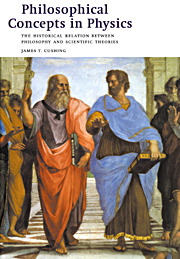 Philosophical Concepts in Physics
Philosophical Concepts in Physics Book contents
- Frontmatter
- Contents
- Preface
- Copyright acknowledgments
- PART I The scientific enterprise
- PART II Ancient and modern models of the universe
- PART III The Newtonian universe
- PART IV A perspective
- PART V Mechanical versus electrodynamical world views
- PART VI The theory of relativity
- PART VII The quantum world and the completeness of quantum mechanics
- PART VIII Some philosophical lessons from quantum mechanics
- 22 The EPR paper and Bell's theorem
- 23 An alternative version of quantum mechanics
- 24 An essential role for historical contingency?
- PART IX A retrospective
- Notes
- General references
- Bibliography
- Author index
- Subject index
23 - An alternative version of quantum mechanics
Published online by Cambridge University Press: 05 June 2012
- Frontmatter
- Contents
- Preface
- Copyright acknowledgments
- PART I The scientific enterprise
- PART II Ancient and modern models of the universe
- PART III The Newtonian universe
- PART IV A perspective
- PART V Mechanical versus electrodynamical world views
- PART VI The theory of relativity
- PART VII The quantum world and the completeness of quantum mechanics
- PART VIII Some philosophical lessons from quantum mechanics
- 22 The EPR paper and Bell's theorem
- 23 An alternative version of quantum mechanics
- 24 An essential role for historical contingency?
- PART IX A retrospective
- Notes
- General references
- Bibliography
- Author index
- Subject index
Summary
In previous chapters we presented and discussed the standard, generally accepted Copenhagen interpretation of quantum mechanics according to which there exists in nature at the most fundamental level an irreducible and ineliminable indeterminism. Although we saw that what historically constituted the Copenhagen interpretation of quantum mechanics is difficult to specify with precision, three central commitments do characterize it. (1) In general, no particle trajectories can exist in a space–time background. (2) No deterministic description of fundamental physical phenomena is possible. (3) There exists in the laws of the fundamental physical phenomena of nature an essential and ineliminable indeterminism or probability (unlike the probability of classical physics, that there reflects our ignorance of the finer details of complex physical phenomena). A flavor of these features of the Copenhagen interpretation of quantum mechanics can be gotten from the quotations at the beginning of Part VIII (Some philosophical lessons from quantum mechanics). On this view, it is in principle impossible to predict, say, the exact future behavior of an electron (that is, to give its position and velocity as functions of the time). According to the Copenhagen school, there can be no causal description of microphenomena in terms of a continuous space–time background (as there is in classical physics). It is generally believed that a causal interpretation of quantum mechanics is impossible, although no proof of this exists.
- Type
- Chapter
- Information
- Philosophical Concepts in PhysicsThe Historical Relation between Philosophy and Scientific Theories, pp. 331 - 344Publisher: Cambridge University PressPrint publication year: 1998


